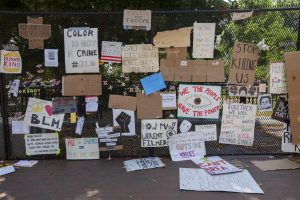
April 4, 1968. May 25, 2020. These are the dates when the Reverend Dr. Martin Luther King, Jr. and George Floyd were murdered. A familiar narrative says that their deaths sparked civil disturbances in cities across America, notably here in Washington, DC.
Today we understand that this bit of historical shorthand has distorted the reality of these events. The bursts of protests, rioting, and general outrage that took place in 1968 and continue at this writing in 2020 were sparked by tragedies, yes, but their causes run much deeper.
This Context for Today list of resources aims to offer the details of the systemic racism and injustices that fueled these uprisings. Injustices have always been known to those affected—people of color, especially Black Americans—but often have not been more widely acknowledged until traumatic events made recognition undeniable. The resources listed here in the spirit of learning from the past show clearly that the racial disparities underlying the violence of 1968 were not new, nor has time since erased them.
These Streets: Comparing the Uprisings of 1968 and Today (Video)
On August 20, 2020, the DC History Center presented “These Streets: Comparing the Uprisings of 1968 and Today,” a conversation with historian Kyla Sommers, author of the dissertation “‘I Believe in the City:’ The Black Freedom Struggle and the 1968 Civil Disturbances in Washington, D.C.,” and Tony Gittens, director of the Washington, DC International Film Festival, who was a student at Howard University in 1968.
View the video here.
Recommended Reading
Reconsidering 1968: A Guide to Selected Research Materials Relating to the Civil Disturbances of 1968 Located in Kiplinger Research Library, Historical Society of Washington, D.C. and other Washington, D.C. Archival Repositories, compiled by Kyla Sommers
“The 1968 Washington Riots in History and Memory” by Dana Lanier Schaffer Washington History 15-2 (fall/winter, 2003-2004)
“Behind the Headlines: the Evening Star’s Coverage of the 1968 Riots,” by Faye P. Haskins, Washington History, 19/20 (2007-2008)
“Home . . . Where the Soul Is [1969],” by Bernette [Marita] Golden, Washington History, 30-1 (spring 2018)
Purchase online
“More than a March: The Poor People’s Campaign in the District,” by Lauren Pearlman, Washington History, 26-2 (fall 2014)
Purchase online
“Its Fingers Were Crossed and Its Guard Was Up”: Washington Prepares for the March for Jobs and Freedom,” by Derek Gray and Jennifer Krafchik, Washington History, 25 (summer 2013)
Purchase online
“Toward a Color-Blind Newspaper: Race Relations and the ‘Washington Post’,” by Ben W. Gilbert, Washington History, 5-2 (fall/winter, 1993-1994)
“Understanding today’s uprisings requires understanding what came before them,” by Jeanne Theoharis, Washington Post, August 11, 2020.
The dc1968 project
This digital storytelling project, curated by Dr. Marya Annette McQuirter, presents stories about Washington, DC during the entire year of 1968. Ambitious in scope, the project moves beyond the hyper focus on the uprising after the assassination of Rev. Dr. Martin Luther King, Jr. and amplifies the art, activism, architecture of everyday life that made 1968 such an extraordinary year in DC.
Ten Blocks from the White House: Anatomy of the Washington Riots of 1968, by Ben W. Gilbert and the staff of the Washington Post (New York: Praeger, 1968)
Published shortly after the events, this book describes what took place day by day, and also addresses the conditions here and in other cities that led to the violence. Available at area libraries and on the used book market, Ten Blocks remains the most consulted source on the uprising.
“The Kerner Commission Report Still Echoes Across America,” by Clyde Haberman, New York Times, June 23, 2020.
The fundamental report of the National Advisory Commission on Civil Disorders, published shortly before Dr. King’s assassination, concluded, “Our nation is moving toward two societies, one black, one white, separate and unequal.” Haberman notes, “The report left scant doubt that it regarded white racism as the tinder igniting those 1960s fires.”
“For black residents who saw D.C. burn decades ago, Floyd protests feel like hope,” by Rachel Chason and Rebecca Tan, Washington Post, June 16, 2020.
On-the-spot observations from activists who remember 1968.
“April 4, 1968 as Told by Black Reporters,” by Richard Prince.
Former Washington Post reporter Prince maintains the Journal-isms website and writes “Richard Prince’s Journal-isms,” a news column on diversity issues in the news media. This post includes multiple eye-witness accounts and reflections.
From Our Collections
When the Kiplinger Research Library reopens, researchers will have access to these collections and items related to the events of 1968.
Click the MS number links for more details.
1968 Riots Oral History collection, 2002-2004. MS 0769
Interview with Daniel Flores, Columbia Historical Society Oral History Project collection, MS 0892
Leroy Hubbard Fourteenth Street Redevelopment collection, 1948-2004 (bulk 1968-1995) MS 0277
Gerard Ivanhoe and Margaretha Nichol Sawyer Diaries MS 0789
“Children of Cardozo . . . tell it like it is,” compilation of children’s drawings and essays on the 1968 disturbances. P 3700
Photographs from multiple collections. Click link to search catalog.
Build Your Library
And check out these local bookstores: Mahogany Books, Loyalty Bookstores, Sankofa, Wisdom Book Center, Harambee Books, Second Story Books, Politics and Prose
Funding for Context for Today was provided from from the Office of the Secretary of the District of Columbia, and HumanitiesDC and the National Endowment for the Humanities (NEH) as part of the 2020 Coronavirus Aid, Relief and Economic Security (CARES) Act of 2020. Any views, findings, conclusions, or recommendations expressed in this program do not necessarily represent those of NEH.